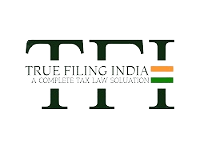Income tax return filing for an individual with salary income of less than Rs.5 lakhs.
Invoicing, GST Filing, Banking and Payroll |
GST Invoice Get GST eInvoice with Input Tax Credit |
TAB-1PERSONAL TAX FILING
What is Income tax :
Income tax is a direct tax that a government levies on the income of its citizens. The Income Tax Act, 1961, mandates that the central government collect this tax. The government can change the income slabs and tax rates every year in its Union Budget.
Income does not only mean money earned in the form of salary. It also includes income from house property, profits from business, gains from profession (such as bonus), capital gains income, and ‘income from other sources’. The government also often provides certain leeway such that various deductions are made from an individual’s income before the tax to be levied is calculated.
Return Type | Applicability |
ITR-1 form can be used by Individuals who have less than Rs.50 Lakhs of annual income earned by way of salary or pension and have one house property only. | |
ITR-2 form must be filed by individuals who are NRIs, Directors of Companies, shareholders of private companies or having capital gains income, income from foreign sources, two or more house property, income of more than Rs.50 lakhs. | |
ITR-3 form must be filed by individuals who are professionals or persons who are operating a proprietorship business in India. | |
ITR-4 form can be filed by taxpayers enrolled under the presumptive taxation scheme. To be enrolled for the scheme, the taxpayer must have less than Rs.2 crores of business income or less than Rs.50 lakhs of professional income. | |
ITR-5 form must be filed by partnership firms, LLPs, associations and body of individuals to report their income and computation of tax. | |
ITR-6 form must be filed by companies registered in India. | |
ITR-7 form must be filed by entities claiming exemption as charitable/religions trust, political parties, scientific research insitutions and colleges or universities |
Income Tax Basic Deductions
Section 80C Deduction
Income tax deduction of upto Rs.1.5 lakhs can be claimed on amount paid or deposited in PF, PPF, LIC premium paid, National Savings Certificate, ULIP, principal part of repayment of housing loan, tuition fees paid for children, term deposit in bank, deposit in Senior Citizen savings scheme and more.
Section 80D Deduction
Section 80D deduction can be claimed by individuals and HUF for payments to medical insurance paid by cheque under GI scheme. Also fees of upto Rs.5000 paid for preventive health checkup can be claimed as income tax deduction under Section 80D.
Section 80EE Deduction
Additional deduction under Section 80EE can be claimed on interest on housing loan paid through EMI by the assessee. The maximum deduction allowed under Section 80EE is Rs.1 lakh. The deduction can be availed on the first home loan, the amount of loan does not exceed Rs.35 lakhs and the property value does not exceed Rs.50 lakhs.
Section 80E Deduction
Section 80E deduction can be claimed by individuals for repayment of interest on loan taken in respect of higher deduction. The amount of interest paid can be claimed as a deduction under Section 80E. The maximum period for which this deduction can be availed is 8 years starting from repayment of loan or till the entire loan is repaid, whichever is earlier.
Section 80G Deduction
Section 80G deduction can be claimed on donations to certain funds, charitable institutes within the ceiling amount of 10% of the Gross Taxable Income. The amount of deduction available would depend on the exemption enjoyed by the fund. Section 80G deduction cannot be claimed for cash deductions of more than Rs.2000.
Income Tax Deductions
Various income tax deductions are available for taxpayers to save on taxes payable. You can use the income tax calculator or read the article below to know more about income tax deductions
CALL A FREE CA CS AND CORPORATE LAWYER 24*7



